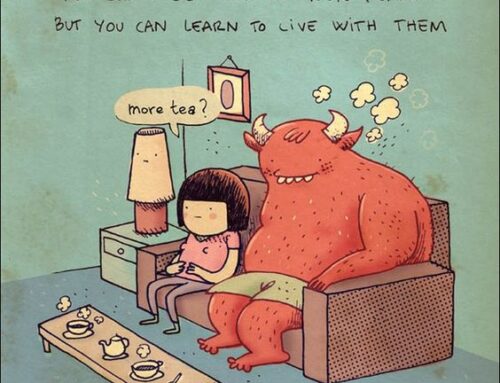Interviewing for Graduate School: 20 Tips for Success
January 14, 2019
Categories: Psychology
I often get asked if I have any tips or advice for students who are interviewing for graduate school. Graduate school interviews can be stressful and anxiety-provoking! To help potential applicants, I decided to write down some ideas for how to be successful on interview day. A couple of caveats before I get started:
- These tips apply best for students interviewing for Ph.D. programs in clinical or counseling psychology. I think some of the suggestions apply more broadly, but other types of programs may have different points of emphasis.
- These thoughts reflect my personal opinions and experiences. Other professors may have different things they are looking for.
20 Tips for Success
Ok, here we go. Here are my 20 tips for doing well on your graduate school interview:
- Congratulations on getting an interview. It is difficult to get into a Ph.D program. These programs are very competitive, and it is hard even to get an interview. Getting an interview means that the professors liked your application, and thought you were good enough to succeed in their graduate program. At this point, don’t worry as much about your GRE scores or GPA. Everyone who is invited for an interview is deemed “good enough” on paper. Now the emphasis shifts to making personal connections, showing that you will be a good colleague, and making the case that you are a good fit for their program and the particular professor you want to work with.
- You are being “interviewed” during your whole visit. This is a really important point. From the moment you get off the plane and are picked up by a graduate student to the moment you get dropped off at the airport, you need to be “on.” The interview isn’t just about your professional credentials, but also about how you are personally. Will you be a good colleague? Are you a nice person? Are you easy to get along with? Little things like leaving a thank you note for the person you are staying with can be important. Don’t do anything weird. Don’t be rude. Don’t freak out if something happens that puts you off your schedule. Common sense interpersonal stuff is important. Being flexible is important.
- Schools will contact you with the details of the interview day. Schools may give you the option to stay with a graduate student. If they give you this option, take advantage of it. This will give you extended time with a graduate student to ask questions and see how they like the school and program. Also, it gives you more time to make a good impression. Finally, sometimes people might wonder or ask questions if they give you the option to stay with a graduate student and you refuse.
- Arrive to interview day early. Make sure you know where you need to go. Give yourself enough time in case something unexpected happens.
- Dress professionally. It’s better to be overdressed than underdressed. I would consider taking out any uncommon piercings and covering up tattoos.
- Bring copies of your CV in case anyone wants it.
- Do your best at each interview. A typical interview day includes individual interviews with several different faculty members. There may also be group interviews. There may be interviews with graduate students. It can be a long day. Each interview is an evaluation, so make sure to focus and put your best foot forward.
- Group interviews with other potential students can be awkward. You want to come across as confident and assertive, but you want to give the other interviewees space as well. You don’t want to dominate or take over. Find a middle ground.
- Interviews with graduate students are really important. Often faculty members will take graduate student opinions about potential candidates very seriously. Be professional, but also be friendly and work on making connections. This is also probably your best chance to get your questions answered about what the graduate student experience at this program is really like.
- The interview with the faculty member you want to work with is very important. Professional fit is important, but making a personal connection is important also. Follow the lead of the faculty member interviewing you. If they are more relaxed, you can probably be more relaxed. If they are more serious, you should be more serious. Make sure you know about the research this person is doing. For example, go on PsychINFO and read 5 of the person’s recent articles. Ask the professor what they have been working on lately. What is the professor’s plan for the next few years? Show interest in the professor’s work. The professor will probably ask what kinds of research topics you are interested in. Be honest here, but also recognize that professors are often looking to mentor graduate students who are interested in doing the same kind of research they are doing. Ideally, there is a close match between your research interests and the professor’s research interests. They don’t have to be exactly the same, but there should be overlap. Otherwise, you may not get accepted due to poor fit with a professor.
- Do some research about the faculty members you will be meeting with. For the primary faculty member you hope to work with, I recommend reading several of their latest journal articles. Be knowledgeable about the professor’s subject matter and area of focus. This shows that you are committed and interested in this topic. I remember one of my graduate school interviews in which I didn’t do this. The professor asked me “what specifically was I interested in regarding [his personal research area]?” I didn’t have a good answer, and I said something vague. I believe this is part of the reason I didn’t get an offer from that school. For other faculty members at the school, I would review their web page so you can at least be knowledgeable about their general research area. But I don’t think you need to read their journal articles.
- Appear as if you are a well-rounded person. Some people might ask you what activities you like to do for fun, outside of school. Have some things to talk about. You are trying to convey that you are a balanced person: absolutely committed to your work and being an excellent graduate student, but also a well-rounded person who has some fun things you like to do on the side.
- Some people might ask you what your career goals are. Most people don’t know exactly what their career goals are when they enter graduate school, and that is okay. Most people say they want to do some “combination of research and clinical work.” This is probably a fine answer. At some places, you may get a boost if your career goal is more closely aligned with the focus of the program or professor. For example, if the program is very research-focused, you might be viewed as a better fit if research is part of your career goals. On other other hand, if the program is more practice-focused, saying you want a career in academia may not do you much good.
- Have several questions prepared to ask both faculty members and graduate students. Here are some ideas:
- Questions for Faculty
- Where do you see your research program going in the next few years?
- What about your work are you most excited about right now?
- What is your mentorship or supervision style for graduate students?
- Are there opportunities to get involved in writing manuscripts for publication? What about presenting papers at conferences?
- What qualities do you look for in a graduate student who is likely to be successful?
- What are a couple strengths of this program?
- What is one weakness or area of growth of this program?
- What kinds of jobs do most students get after leaving this program?
- Questions for Graduate Students
- What do you like best about this program?
- Is there anything you don’t like about this program?
- How does the process work for assistantships?
- How do faculty and students get along? Are faculty members generally supportive of students?
- How is the clinical training? What kinds of clinical placements do students have? How is the clinical supervision? What opportunities are there for assessment?
- What is the quality of the coursework?
- How successful are students in matching for internship?
- How much money do students receive for their stipend? Is tuition waived? Is the stipend enough to live comfortably, or do students usually have to take out extra money to live?
- Do you like living in this city/town/area of the country?
- Be nice to the fellow applicants you are interviewing with. Don’t get “competitive.” Don’t be rude or standoffish. If you decide to attend school here, many of these people will be your friends and colleagues. Also, people are watching to see how you engage interpersonally with others. If you are rude, or stay in the corner by yourself, this can be a red flag. Be friendly and focused on connecting throughout the interview day.
- Go with the flow. If they have a happy hour or similar event with the graduate students, it’s okay to have a drink or two. (It’s fine not to drink if you don’t normally drink.) But I wouldn’t have more than a couple drinks. Know your limit and don’t get anywhere close to drinking too much.
- Don’t do anything weird. Don’t make inappropriate or sexual jokes. I remember one year when I was in graduate school, a male interviewee made a sexual joke to one of our female graduate students at lunch. He was out.
- Send a thank you note to the professor you want to work with. Not necessary, but it is a nice gesture.
- Remember that you are also interviewing the school. Often on interview day, the focus is on the school interviewing you. But you want to find out if the school is a good fit for you and your goals/interests. Graduate school is a big commitment and a huge step in your career trajectory. It is a ton of work. If you attend this school, you will be spending the next 4-5+ years with these faculty members and graduate students. Do you like the place? Are the people friendly and supportive? Is this school a good fit for you personally and professionally?
- Good luck! Take a deep breath, do your best, and accept the rest.

Related Thoughts

Subscribe To My Newsletter
Join my mailing list to receive the latest blog posts.
Receive my e-book “The Mental Health Toolkit” for free when you subscribe.




